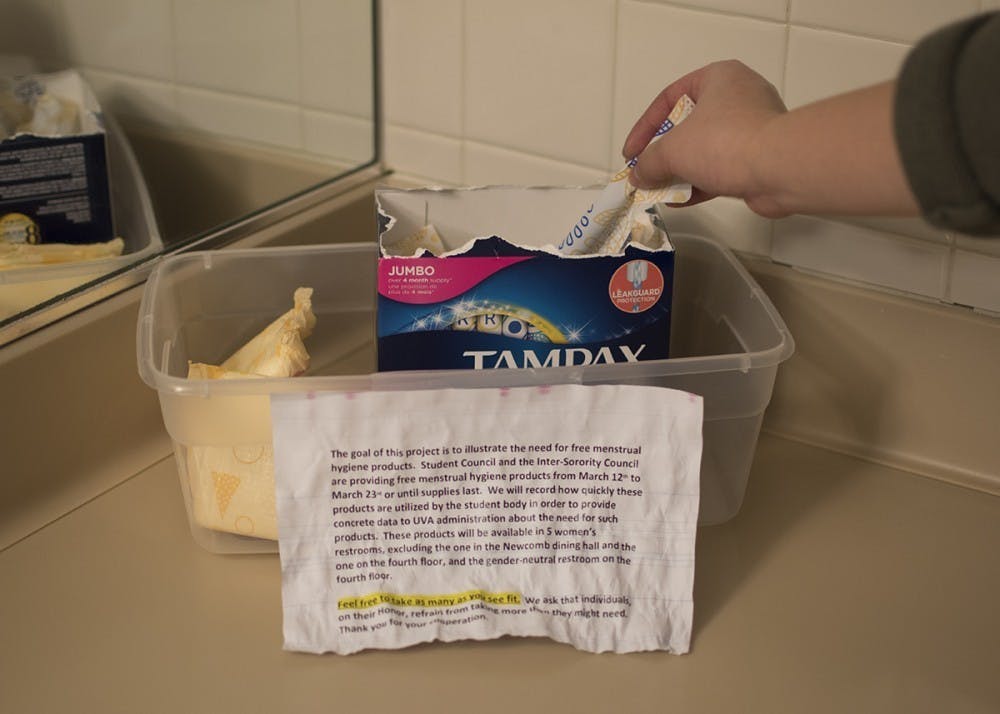Menstrual hygiene products are as essential as toilet paper. Students who find themselves without a pad or tampon in their moment of need must then deal with an unexpected crisis. Not having direct accessibility to menstrual hygiene products has caused those affected to miss class or extracurricular activities. This can pose a direct threat to students’ ability to fully participate in their educational experience. If the University were to provide access to free menstrual hygiene on our Grounds, it would diminish the chance of students finding themselves in difficult or uncomfortable situations. Student Council has been working diligently to demonstrate that free and accessible menstrual hygiene products are essential and require financial support from the University to become a reality.
This initiative was first set on the Student Council agenda by a collaborative discussion in a Safety and Wellness Committee meeting during the last school year. The Safety and Wellness team began to plan the necessary steps to ensure that the University prioritized such an essential initiative. After spring break this past March, the Safety and Wellness Committee partnered with the Inter-Sorority Council to provide free menstrual hygiene products in five Newcomb Hall bathrooms. Over the course of five days, 750 tampons and 900 pads were distributed to members of our University community. This project, originally scheduled as a two-week seed project, lasted only five days due to the overwhelming need for more accessible menstrual hygiene products within the University. Since then, Student Council has been diligently working on finding the means to continue providing free menstrual hygiene to members of our University community.
This fall the Safety and Wellness team has partnered with Madison House to provide free products in Madison House bathrooms to collect data that gauges the off-Grounds need for these products. In the coming semester, University students, faculty, staff and visitors can expect to see more short-term seed projects in the Alderman, Clark and Clemons library bathrooms. In addition, during the month of November the Safety and Wellness team will conclude the semester with another seed project in five Newcomb bathrooms. By collecting more data from students, the Safety and Wellness committee will be able to see the need of the University community for access to free menstrual hygiene products.
This effort is not unprecedented. Many schools nationwide have begun to fund such initiatives, including the University of Minnesota which has provided free products in women’s bathrooms for around a decade and have expanded their initiative to include gender-neutral bathrooms in 2016. If and when the University provides free menstrual hygiene products, the University will set a standard for public schools in the South because free menstrual hygiene has mainly been an initiative in Northeastern private institutions. In addition, by providing free products, we believe that the University will see a decreased stigma around the menstrual cycle. The University has a great opportunity to define the future culture on Grounds and across other institutions in the United States by being among the leading public universities distributing free menstrual hygiene.
Currently, Student Council has been using its own non-Student Activities Fee funding to provide the products along with donations from the Inter-Sorority Council for the short-term seed projects. This method is not the ideal sustainable solution to providing free menstrual hygiene throughout the entire University. The location of each seed project is limited as well as the duration of each project. Only focusing on one or a few buildings at a time, for as short as five days to two weeks — depending on how long supply lasts — is not the most effective way to be providing free menstrual hygiene. The best vision for a long-term sustainable goal is to have the University provide products in all restrooms on Grounds.
Through many meetings to make this goal a reality, myself, Chair of the Representative Body Ellie Brasacchio and Safety and Wellness committee member, Merly Konathapally, are diligently planning to help the University provide free feminine hygiene in the most effective way possible. One example is our work to increase the sustainability of these products through the Student Council’s continued efforts to find vendors who produce dispensers that allow the menstrual hygiene products to be distributed one at a time. These sustainable efforts will better help the University effectively prepare for the numbers of products that must be purchased, which will ultimately help those students that need it.
As we look to the future, we will continue to work with the University on providing free menstrual hygiene to all and we are committed to making funding for free menstrual hygiene a priority for the Board of Visitors. Until then, students can expect to find that Student Council and the Inter-Sorority Council will be providing free menstrual hygiene products from Oct. 22 to Nov 4. The products can be found in the second and fourth floor restrooms in Clemons, the fourth floor restrooms in Alderman and in the main floor of the Clark. Through this initiative look forward helping define the future of our University by making these products more accessible.
Katie Kirk is a second-year College student and chair of the Safety and Wellness Committee for Student Council.







